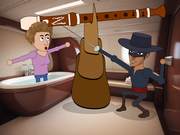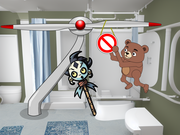to exist; to be alive / (of sb or sth) to be (located) at / (used before a verb to indicate an action in progress)
can / may / able to / to approve / to permit / to suit / (particle used for emphasis) certainly / very
可
=
丁
+
口
:
Alternative mnemonic symbol: kebab, from the pronunciation "ke". Karl Marx (k) is preparing a kebab (mnemonic symbol for 可) in the elevator's living room (e3). He also skewers mandarins (口) on the long steel nails (丁) and will only allow (可) his guests to eat the rest of the kebab if they eat their mandarins first.
can / to be able to / might possibly / ability / (physics) energy
to eat / to consume / to eat at (a cafeteria etc) / to eradicate / to destroy / to absorb / to suffer / to stammer (Taiwan pr. for this sense is [ji2])
interjection of surprise / Ah! / Oh!
啊
=
口
+
阿
:
Auntie was supposed to meet Albert Einstein in front of the ashram, but Albert is nowhere to be seen. There is just a huge mandarin lying around. After auntie has waited for a long time, she finally decides to peel the mandarin. As she peels of the first piece, Albert Einstein jumps out of the mandarin, shouting "阿姨! Surprise!" Auntie in turn just screams "啊" in surprise as she swiftly suffers from a heart attack.
interjection or grunt of agreement / uhm / Ah, OK / expression of recognition / Oh, it's you!


